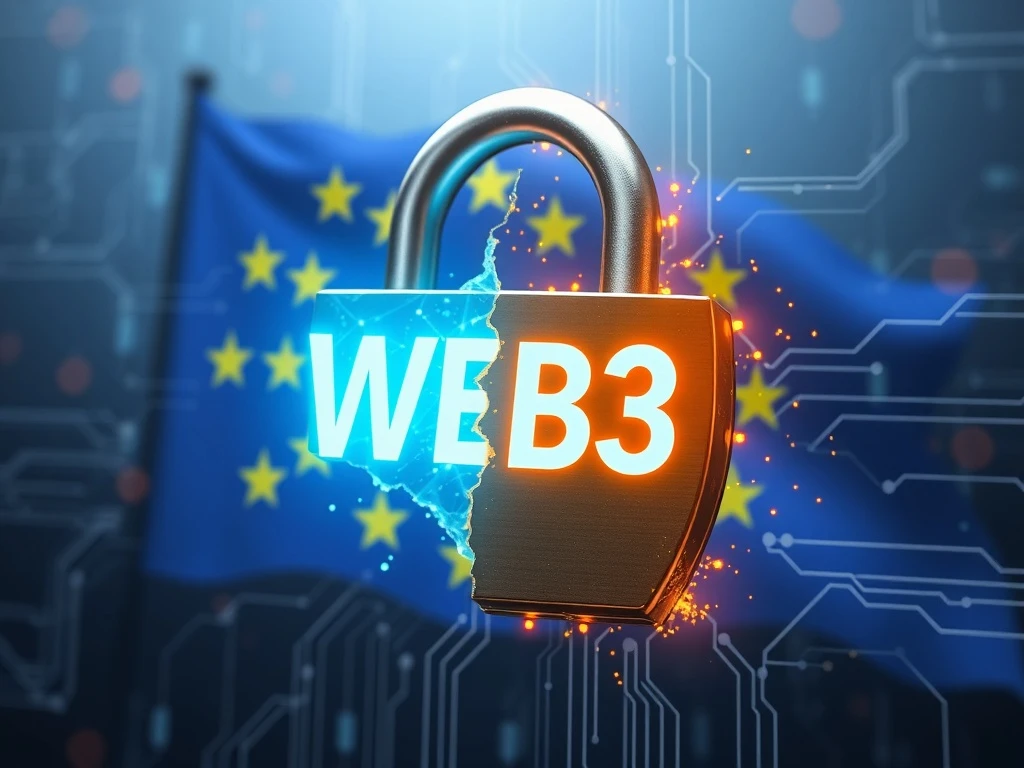EU Chat Control: Urgent Warnings Push Users Towards Web3 Alternatives

The proposed EU Chat Control law casts a long shadow over digital communication. This controversial legislation threatens the fundamental right to digital privacy. Experts warn it could shatter encryption and force a mass migration. Consequently, many users may soon seek Web3 alternatives for secure online interactions. This looming decision by EU lawmakers has sparked widespread debate and concern.
EU Chat Control: A Direct Threat to Encryption
The European Union is currently debating its “Chat Control” law. Officially, this regulation aims to prevent child sexual abuse. However, it requires platforms to scan private messages. This scanning must occur before messages are encrypted. Critics argue this effectively creates a backdoor into secure systems. This action directly contradicts the EU’s own stated commitments to privacy. Hans Rempel, co-founder and CEO of Diode, calls the proposal a “dangerous overreach.” He states it offers “inherently corruptible entity nearly unlimited visibility into the private lives of individuals.” Such measures are incompatible with an honest value statement of true digital privacy. Therefore, this proposed law poses a significant risk to the integrity of encryption.
Eroding Digital Privacy and Public Trust
Elisenda Fabrega, general counsel at Brickken, also raises alarms. She notes the law appears “difficult to justify.” It clashes directly with Articles 7 and 8 of the EU Charter of Fundamental Rights. These articles protect communication confidentiality and personal data. Client-side scanning monitors content on user devices. This occurs even when there is no indication of unlawful activity. Such pervasive surveillance erodes public trust. Platforms make a promise to users: their private communications will remain confidential. This promise is fundamental to digital interactions. Breaching it pushes users away. It undermines the very foundation of secure online interactions. Ultimately, this directly impacts digital privacy for millions.
The Inevitable Shift to Web3 Alternatives
Experts predict a clear outcome if the law passes. Privacy-conscious users will increasingly explore Web3 alternatives. These platforms prioritize user data protection. They build robust encryption into their core design. Rempel emphasizes Web3’s core mantra: “Not your keys, not your data.” This principle ensures true self-custody for information. Users maintain sovereignty over their data “from cradle to grave.” Fabrega agrees that privacy-conscious users will seek decentralized options. This potential shift could fragment the European digital market. It may also weaken the EU’s ability to shape international norms on privacy. Consequently, decentralized solutions offer a compelling escape from centralized surveillance.
Dangerous Precedent and the Future of Decentralized Solutions
This regulation sets a dangerous precedent. It impacts both legal and technological standards globally. Rempel warns against the potential for tool misuse. “There are no guarantees,” he states. Over 10% of all data breaches occur in government systems. This fact highlights the inherent risks of centralized control. Trust in traditional messaging platforms will inevitably decline. Therefore, decentralized solutions become more attractive. These systems offer robust privacy by design. They empower individuals with data control. This contrasts sharply with centralized surveillance. The battle for digital freedom continues, driven by innovation in Web3.
Germany’s Pivotal Role in the EU Chat Control Vote
Germany holds a pivotal vote on this controversial legislation. Its final stance will determine the law’s fate. Currently, 15 EU countries support the proposal. However, they fall short of the 65% population threshold required for passage. If Germany votes in favor, the law will likely pass. Conversely, an abstention or opposition from Germany could stop it. Rempel believes the likelihood of passage is “low.” Yet, he cautions that attempts to subvert fundamental human rights will continue. The outcome of the EU Chat Control vote remains uncertain. Ultimately, it will profoundly shape the future of online communication and digital privacy.
The debate over the EU Chat Control law highlights a critical juncture. It pits safety concerns against fundamental digital privacy rights. Experts agree this legislation threatens the very fabric of encryption. It pushes users towards more secure Web3 alternatives. The EU faces a profound choice. It can either uphold its privacy commitments or risk fragmenting its digital market. The world watches as Germany prepares its vote. The implications for global digital rights and the adoption of decentralized solutions are significant.







